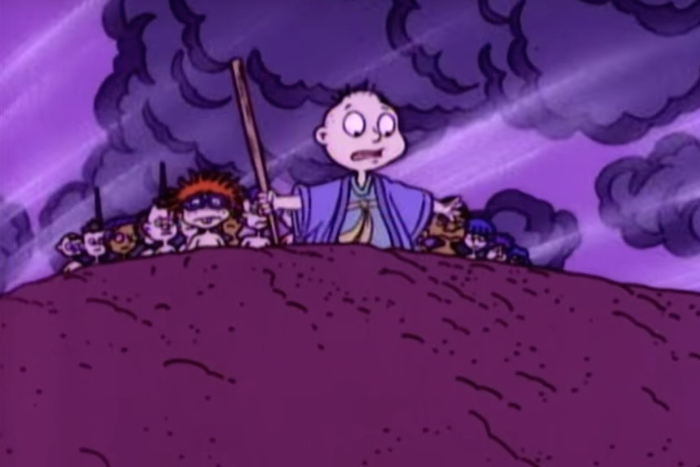
Growing up in a Christian household, I didn’t know much about Jews or Judaism; all I knew was that they followed what I was taught was the “Old Testament” and followed a religion that inspired mine.
Because most of the movies and TV shows I grew up watching didn’t heavily feature Jewish characters, the few instances of have Jewish-themed plots stood out to me: The “Bar Mitzvah Boy” episode of Diff’rent Strokes, the episode of Hey Arnold! featuring Harold’s anxiousness about his bar mitzvah, and of course, the one episode most Jewish millennials probably remember: The Rugrats Passover special.
Rugrats was one of my favorite TV shows, so I watched the Passover episode every year when the holiday came around. It gave me a firsthand learning experience about a holiday that often coincided with Easter – but for many Jewish children, it provided a sense of validation and representation in a media otherwise occupied with Christian holidays.
As odd as it might sound, the babies’ retelling of the story of the Exodus gave a lot of children an appreciation for their Jewish identities, and that’s pretty incredible.
The episode focuses on a seder hosted by Tommy’s Jewish grandparents, Boris and Minka; his Jewish-adjacent father, Stu, and his cousin Angelica are less than enthusiastic about attending. When the seder begins, Boris is nowhere to be found, so the babies go looking for him, eventually finding him locked inside the attic.
The attic locks from the inside, which leads to a great bit in which all of the adults eventually come looking for Boris and the babies and, one by one, find themselves locked inside, too. Stuck with nowhere to go, Boris tells the family the story of Passover, and the babies envision themselves as the characters of the story.
I appreciate how the writers convey the seriousness of this holiday while also not giving children more than they can handle.
Tommy takes on the role of Moses, who leads his friends (played by Chuckie, Phil, and Lil in the role of Hebrew slaves) out of Egypt and stands up to his bossy older cousin in the role of Pharaoh – reimagined as a bratty toddler with a love for toys and the “freedom” to do whatever she wants, a purposeful play on holiday’s theme of freedom from bondage.
In addition to these changes – including Tommy yelling “Let my babies go!” – the writers altered the plagues to make them more kid-friendly while still managing to work.
Nickelodeon chose to leave out the plagues of boils, flies, hail, and the Nile turning to blood, while the others are remixed for comedic effect, i.e. Angelica being covered in locusts and lice, bumping around in the dark, and finding her palace swarmed by “wild beasts.”
Even the death of the firstborn manages to straddle the line between serious and silly. In lieu of blood, the babies cover their doorways in red paint, and Tommy explains to them that those houses will be “passed over.” (One of them replies, “I guess that’s why they call it Passover,” a great example of this show’s meta sense of humor.)
When Tommy’s Moses threatens Angelica’s Pharaoh by saying that the firstborn child of every Egyptian will be “taken away” (instead of “killed”), she realizes that she herself is a firstborn child – and ultimately lets them go.
What makes this episode so great isn’t just that it educated viewers about the Exodus. It was a love letter to (a large part of) Jewish culture, displayed on a popular TV show every year for the world to see.
It wasn’t perfect, of course. Some viewers were put off by the show’s portrayal of Boris and Minka as Yiddish-speaking zayde/bubbe stereotypes, and rightfully so – but I, for one, always saw those characters as being earnest and loving people (when they’re not busy kvetching about whose Passover dishes they get to use!) I found Stu’s monotone delivery while reading the Haggadah hilarious, and I can imagine many families can think of that one relative (or maybe a few of them) who share his lack of enthusiasm when their turn to read comes around.
Most importantly, I appreciate the episode’s ultimate focus on holidays as a time of togetherness.
Even though they all ended up locked in an attic, they got to spend an evening together learning and being close to one another – and if celebrating the closeness we share as family and friends that we often take for granted doesn’t exemplify the heart of Judaism, I don’t know what does.
Looking for more great Passover viewing? Check out “5 Passover Movies You’ll Love.” For more Jewish content, subscribe to the Ten Minutes of Torah series.
